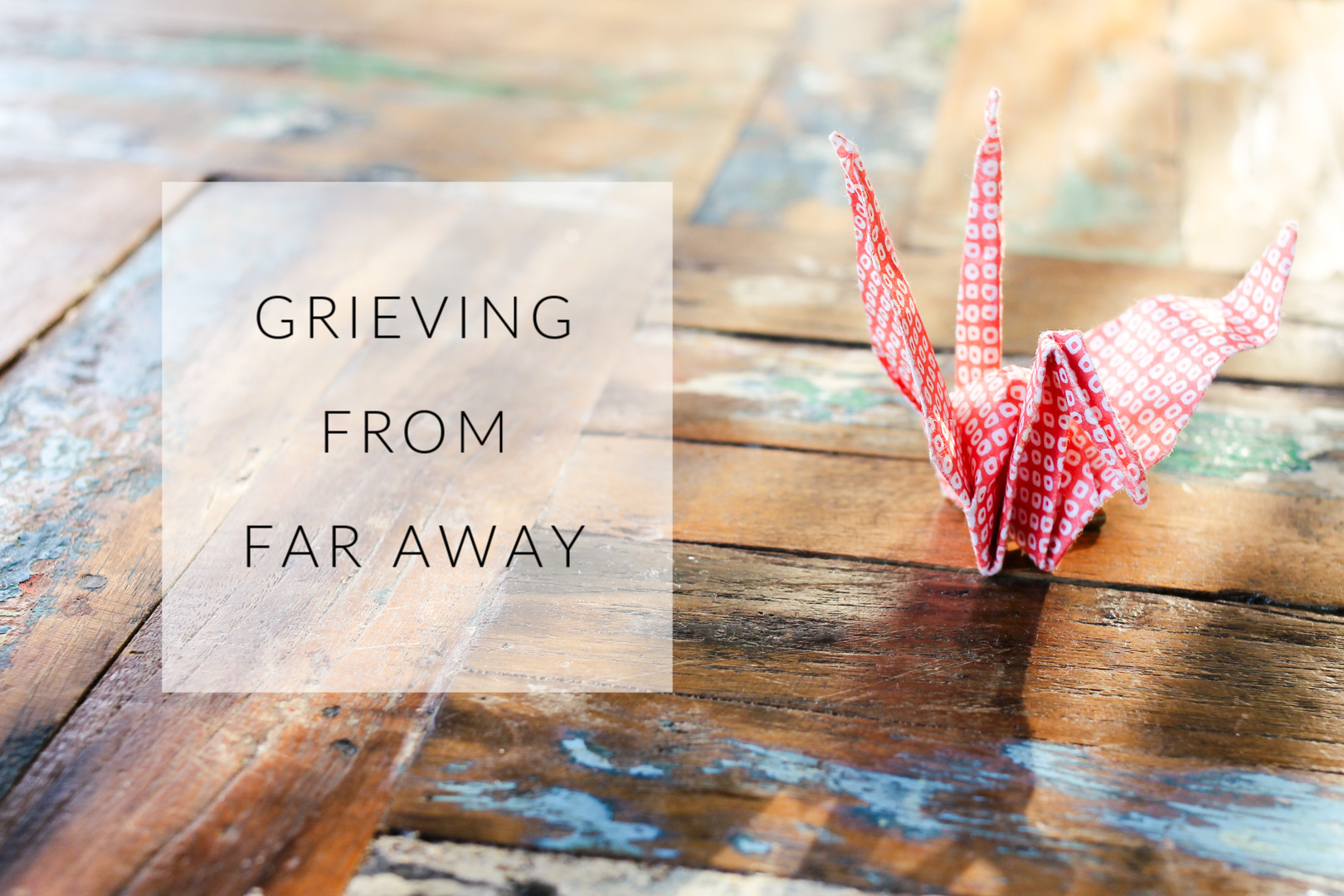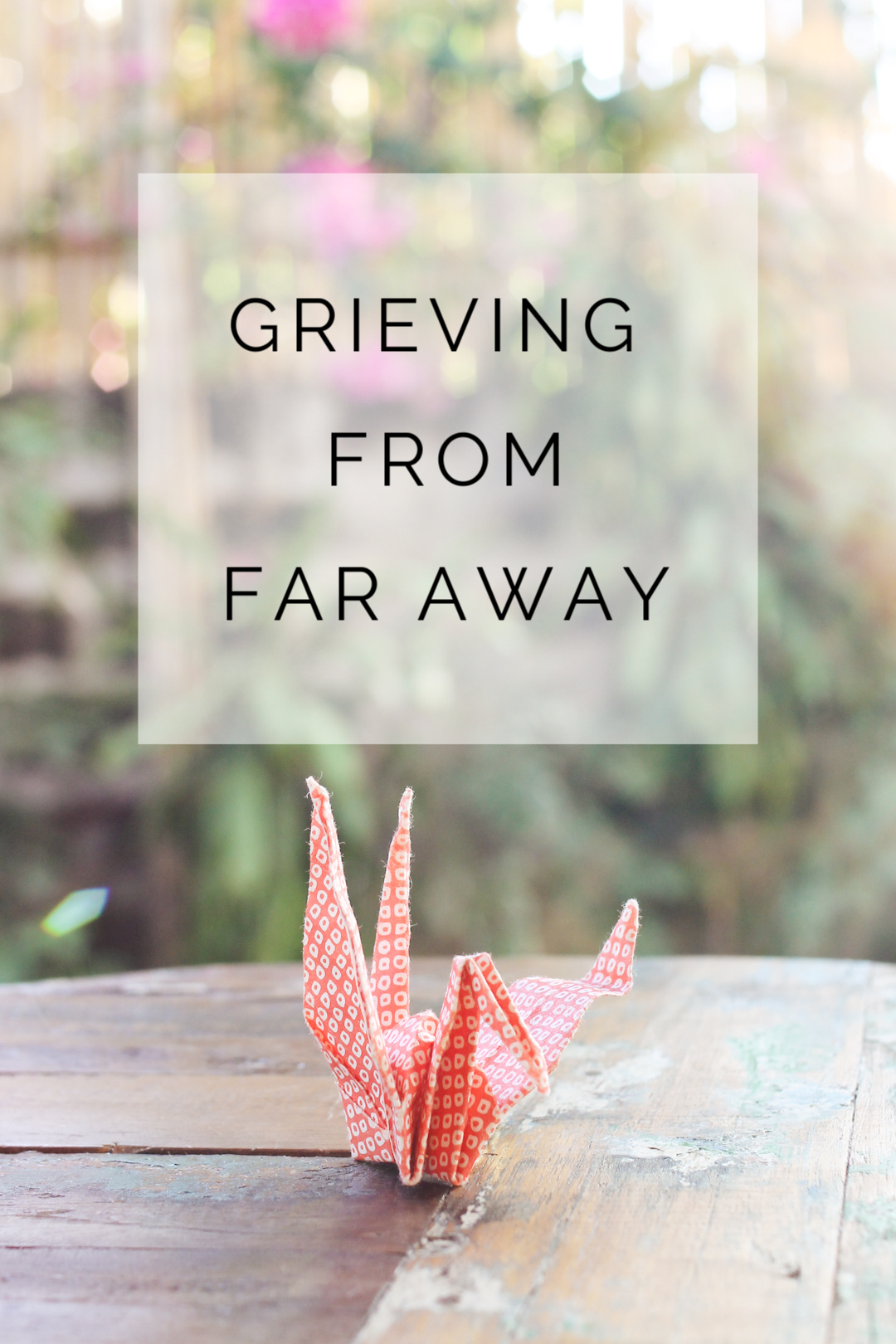Today many people are dealing with grieving from far away due to the novel coronavirus. Reading various stories of people going through a grieving process away from their family members brought me back to my memories of loosing both of my grandmothers in 2005 while living abroad. I realized that grieving from a distance is no longer an aspect of life that only expats deal with these days.
When I married my American husband 20 years ago and moved away from Japan, where I’m originally from, to Texas, my husband’s home state, I knew that I would miss out on significant events with my family. It did cross my mind that I might not make it to the last moment of someone very important to me.
In 2005 I lost both my maternal and paternal grandmothers within 5 months apart. My husband, our several-month-old baby, and I were living in Dakar, Senegal at that time. West Africa is on the other side of the globe from Japan. I was very close to my maternal grandmother. After my two sisters, twins, were born, I started spending a lot of time at my maternal grandparents’ home. I was only 17 months old when my sisters were born. My maternal grandmother was like my second mother. She and I remained close till her death.
Just to provide a little background, I have medically evacuated and given birth to our first child in Japan in 2004, and thus, I have already experienced 36 hours of travel with our 6-week-old infant from Japan back to Senegal. I could manage it with my husband. I, however, couldn’t imagine traveling alone with a several-month old baby across the globe. Unfortunately, we also knew that the plane tickets for both our baby and myself between Senegal and Japan would’ve cost us a small fortune. It was an excruciating decision for me, but it was obvious to my family: I couldn’t go home for my grandmothers’ funerals.
Grieving Away From My Own Family
Grieving is a necessary process to get past a painful event in life. There is no shortcut or way around it. If you hide your loss in the back of your mind and close the door to it in order to avoid dealing with it because it’s too painful, it will eventually find the way out and haunt us. That’s speaking from my experience.
When I faced with the bereavement while living abroad, I ended up letting my sorrow linger for years. What did I do wrong? I came to realize that there were two hurdles that made mourning for my grandmothers prohibitive for me.
Grieving Alone
The most difficult aspect of grieving far away was grieving alone. I had to mourn by myself far from my family members. My family’s grieving was only at the extent of imagination in my head. On top of that, the guilt of not being able to be with my parents crushed my conscience. I processed the death of my grandmothers with the information I collected in the email messages that I received from my family. While living in Africa, with a new born, trying to survive the first time motherhood, my mind was beyond a world away from my family in Japan. I wanted to cry out loud, but I could only sob. Strangely, I felt deprived of the opportunity to cry and let out my agony. At that time, it taught me that mourning with others who are suffering the same pain is part of a grieving process that helps you let out your grief. Being far away from my family left me feeling crippled.
Grieving Without Closure
Another obstacle of grieving from a distance that condemn me to a difficult grieving process was an absence of closure. Even though I understood the death in my head, my mind couldn’t grasp the intangible fact. My life in Africa was far removed from the mourning process. A funeral or memorial service is a ritual that grants visual and emotional closure to an event of your loss. Skype has only been around a little over a year at that point in 2005. Video calls on a mobile phone was non-existent. Most people including myself hadn’t heard of Facebook yet. Majority of the world population hadn’t known about blogs yet, either. (Even though a research shows that 10% of the Americans were reading blogs, it wasn’t as well known worldwide yet.) Online resources were limited back then.
What prevented my spiraling down into depression, I thought, had to do with my first baby. Having my baby daughter helped me get distracted. Unfortunately, what I didn’t realize was that it allowed me to neglect my heart and mind needing for some attention. I may have dodged depression, but ambiguous reality of my loss stayed as an unresolved matter in my heart. As a result, sorrow lingered and absence of closure prolonged my grieving process.
Suggestions For Those Who Grieve From Far Away
I would like those of you who are unable to fly home for a funeral or memorial service of your loved one to know that you shouldn’t blame yourselves (or others). In case you are doing that. You shouldn’t feel guilty for having chosen to move away from your family. We can’t make decisions based on what we may miss in our lives. Sometimes life is out of our control. It’s just the way it is.
I kept thinking what people can do differently in order to alleviate some of the burden that those who grieve alone from a distance carry. According to an article by American Psychological Association, depression and anxiety can co-exist with prolonged grief. Having experienced a difficult grief myself, I wanted to provide my perspectives. I’m obviously not a psychologist or counselor. Please read them as suggestions from a friend. Grief won’t magically go away, but I hope that these will be of some help to alleviate your pain.
Try To Find A Way To Participate
In today’s day and age, technology allows people to virtually participate in any events from afar. While it’s not going to be the same as seeing in person, it’s far better than not having it at all. Funeral homes seem to offer live-streaming of services in the U.S. If that is not offered in your home town, you may be able to find someone outside of bereaved family members to livestream your loved one’s funeral or memorial service.
If that is also not a possibility, you can send flowers, financially help your family, write a message, or create a video and send it. There is no limit. It will help you feel the connection with those who are there. What I craved was that connection. I desperately wanted to be part of the funeral, but I wasn’t able to. I believe that a virtual participation would have made a significant difference in my opinion.
Related Article
How to Manage The Loss of A Loved One from A Distance
Have Closure On Your Own
If you can’t make it to a funeral or service, that doesn’t mean that you can’t have closure. Having a ceremony that is symbolic and meaningful to you and to honor the life of your loved ones will allow you to have closure. The most important part of it is that you work towards accepting the person’s death in a positive way. If I could go back in time, I would tell myself to write letters to my grandmothers, buy some flowers and have a ceremony on my own to honor my grand mothers’ lives. When I faced with the news about their passing, I was too focused on what I couldn’t do. Had I spent time organizing my memories and thoughts and pouring some positive energy into creating something, however small, it would’ve shifted my mind to work towards the positive acceptance of their deaths much sooner than I did.
Related Article
Grief and The Fear of Letting Go
Yoga & Meditation
Yoga’s teaching has helped me deal with my internal struggles. It has allowed me release some tension I stored in my body. I’m grateful for the gift of yoga philosophy. I suggest you find the right type of yoga that meets your needs and suits you.
My favorite is Yoga With Adriene.
Stay In Contact With Your Families
Since I didn’t feel right to disturb my parents whilst they had so much to deal with and had no space other than their own grief, I kept silence. In a way I may have been waiting for them to initiate the conversation. In hindsight, I wish I did a better job letting them know how much I was thinking about them. I know that it means a lot to hear that someone is thinking about you in the darkness. I knew my parents thought of me even if they didn’t express much. Reserving myself from contacting my parents in a belief that I didn’t have much to offer didn’t help. Opening up to my family and initiating any conversation would have helped me deal with my pain. I’m sure you have much better internet connection than the unreliable internet connection I had in West Africa in 2005.
Related Article
How To Help A Grieving Friend Long-Distance
Dealing With Anxieties
Our world filled with unknowns and uncertainty creates a great deal of anxiety for everyone. I’m afraid we’re not even close to containing the disease. I think about my parents and siblings back home everyday.
I had a family emergency unrelated to the coronavirus back in January of this year, but I couldn’t fly home because my passport was away due to visa renewal. It was a terrible timing. It shocked my parents a bit, I’m afraid. I worry that they probably think that I won’t fly home for family emergency and delay an important message until it’s too late for me to fly home. I will use all I have to go see my family, but sometimes stars don’t align.
It’s not healthy to worry yourself for what may or may not happen to you. No one can prepare himself/herself for a loss of his/her loved one.
However, when you find yourself in the darkness of bereavement, I hope you can remember that there is always an end to the tunnel. You take one day at a time. If you need professional help, you should seek help. It’s very important to take care of your heart and mind for your loss so that you can love those who are alive.




Leave a Reply